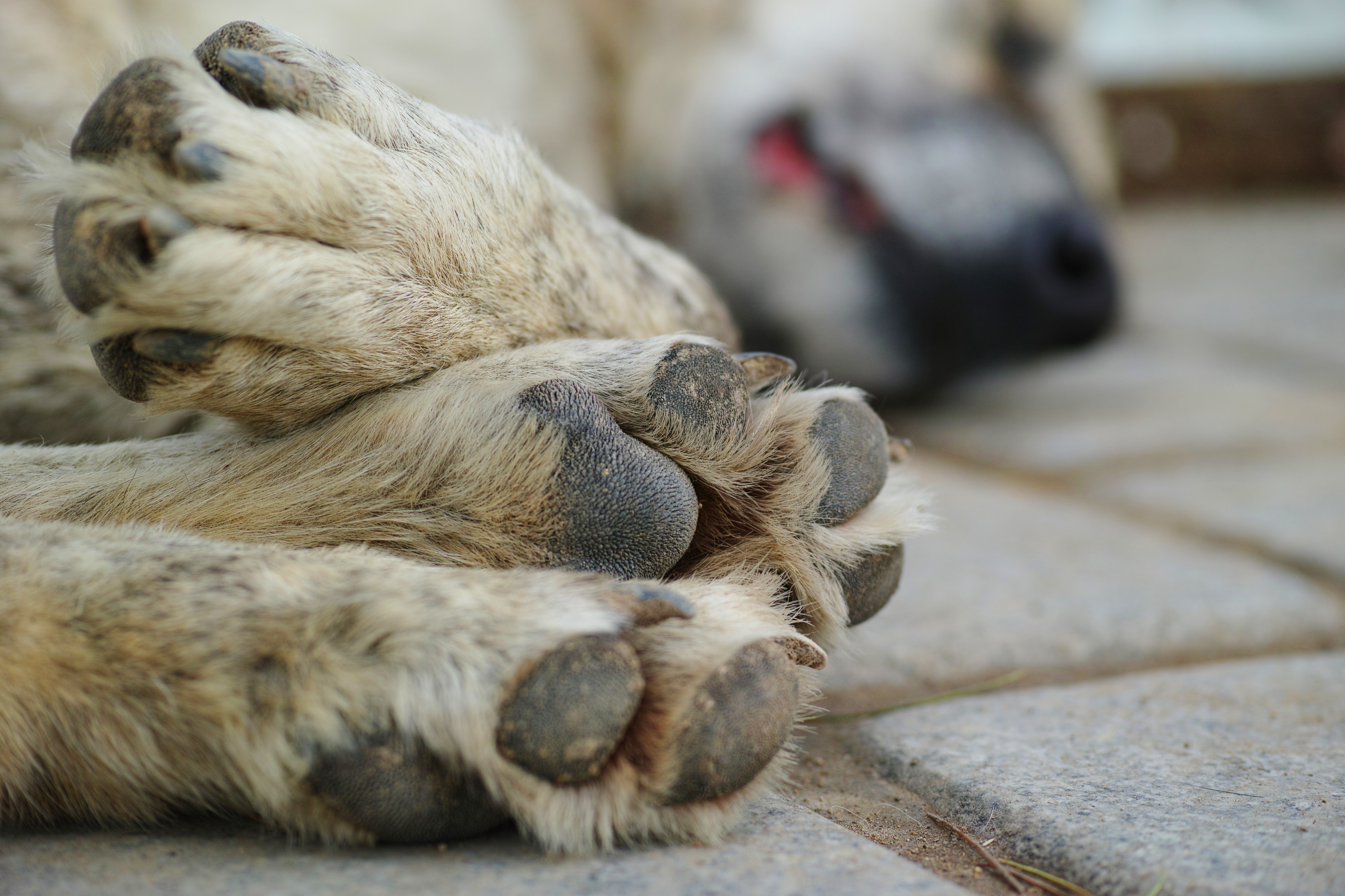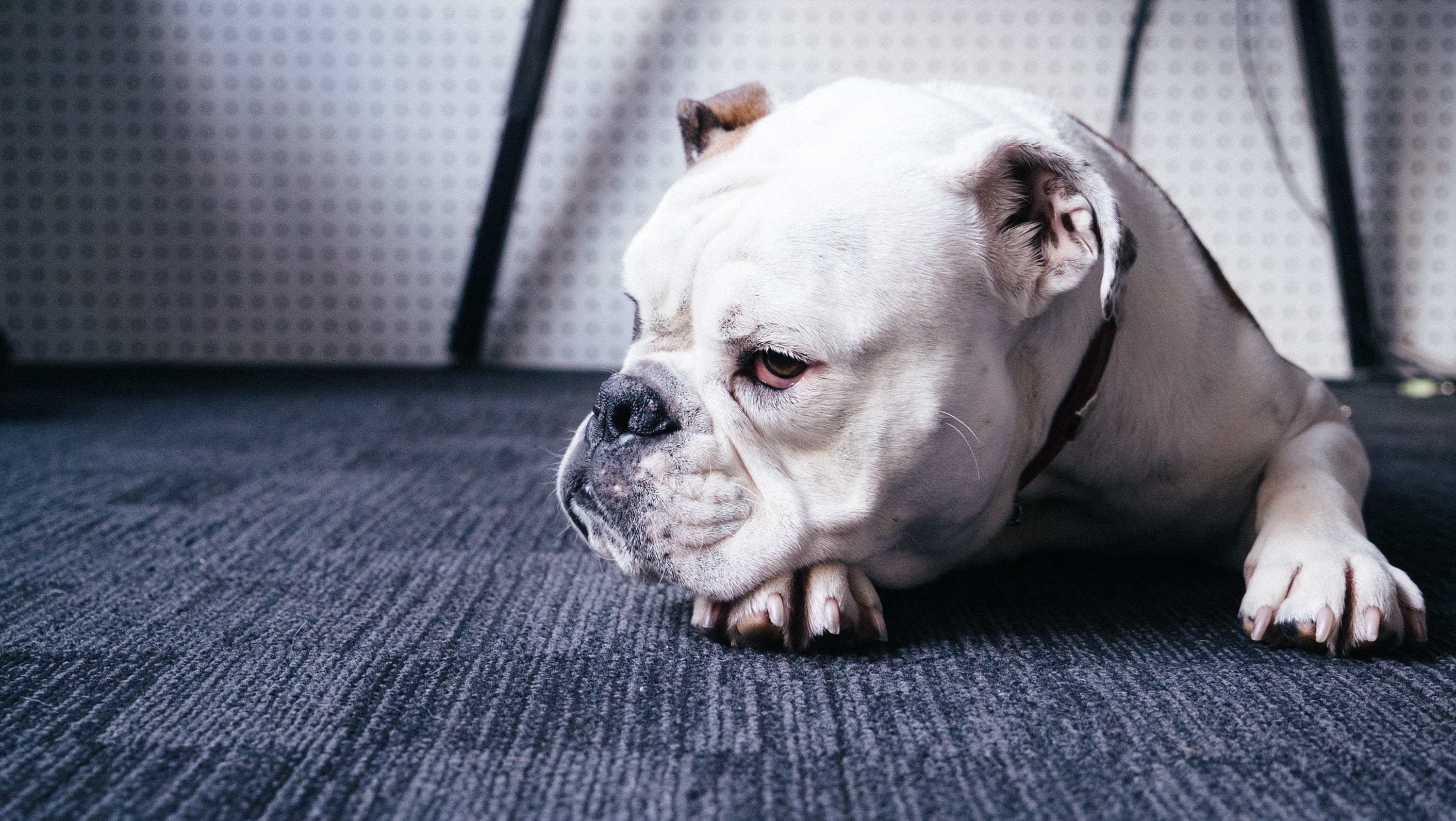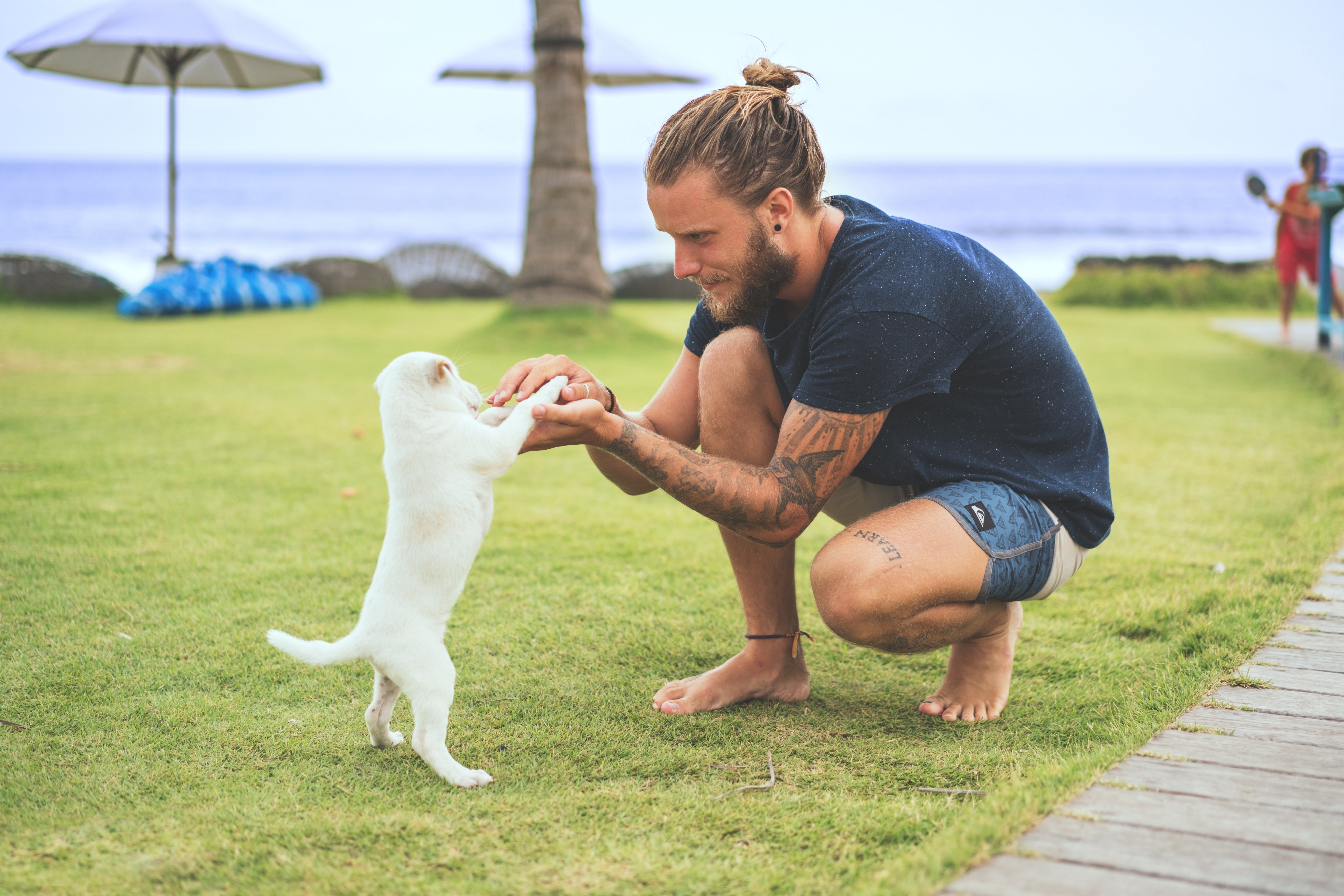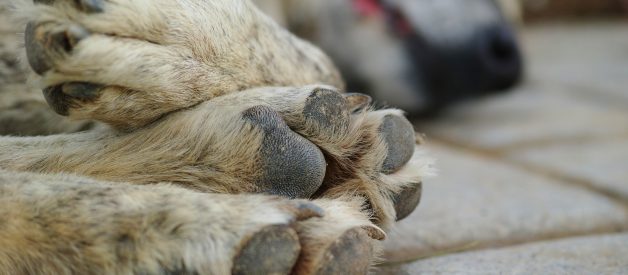 Photo by engin akyurt on Unsplash
Photo by engin akyurt on Unsplash
We devote a lot of attention to our dogs because we love them so much. And that?s why it?s important for us to know which dog behaviours are completely natural and which can indicate serious problems. One of the habits that is quite controversial concerns licking and biting paws.
You?ve probably witnessed your dog washing his paws many times, and this is not surprising, because licking or gently biting them is a common behaviour for pets. Dogs and cats, to a greater or lesser extent, take care of hygiene and ?clean themselves?. Grooming behaviour is easy to notice as your dog will lick each of their paws; not focusing specifically one paw. However, if you have noticed that the next day in a row your dog licks his paws (or only one paw) with great commitment or bites them and does it persistently as if he wanted to eat them, it is a sign for you that it is worth taking a closer look at your pet. The dog licks its paws for several reasons, but not all of them must herald serious problems. I will try to explain when and why the dog licks its paws.
Let?s have a look at some of the reasons which keep your dog licking their paws!
1. Psychological issues ? Anxiety and stress, OCB, Boredom
Dogs, like people, may have a depressed mood and feel sadness, loneliness, anxiety and even depression.
Excessive licking can be a compulsive disorder related to stress caused by any changes in our lives (e.g. a new baby or animal at home, death in the family, moving to another home), stress that occurs with the age of the dog (some dogs develop anxiety as they get older due to a decline in thinking, learning and memory) or when the pet does not receive adequate attention from the owners of the form of play or petting (boredom). In such situations licking paws brings them relief and reduces stress hormone (cortisol) levels In the dog?s body ? this activity is reassuring for them. Unfortunately, excessive compulsive licking can irritate the skin and lead to the formation of aching wounds and bacterial infections.
 Photo by meredith hunter on Unsplash
Photo by meredith hunter on Unsplash
We must also remember that the reason for the excessive licking of the paws may be, for example, the fact that the dog stays at home alone for a long time and does not cope with loneliness. Then we talk about the so-called separation anxiety.
Dogs with a strong emotional connection with their guardians may feel the fear of parting when they leave the house. This is a fairly common problem in adopted dogs that may feel anxiety and fear in difficult situations. Watch when your dog starts licking his paws and what other things are happening at home at this time. You may also notice other symptoms of anxiety like excessive panting, aggression, excessive barking, urinating and defecating at inappropriate places etc. In such cases, try to find out what is causing anxiety in your dog and try to work on it together with the behaviourist.
2. Bacterial infections
As mentioned above, regardless of whether your Doggy licks his paws because of itching, pain, or simply feels like it, it can eventually lead to skin problems or infections.
Bacteria accumulate on everyone, even the cleanest quadruped. And all thanks to the hair, which is located in the spaces between the toes. Due to poor ventilation, they are a place where bacteria have a real paradise. From here, unfortunately, it?s a short way to various infections.
Therefore, if with the excessive licking of the interdigital spaces, in addition to an unpleasant smell, you notice purulent changes on the dog?s paws, be sure to contact a veterinarian who can write an antibiotic, or suggest ways to prevent their recurrence in the future.
3. Allergies and fungal infection
Allergy is one of the most common causes of licking paws in dogs. Allergies can be seasonal or food-related, and can also be a reaction to the cleaning products we use at home. Dogs that suffer from food or environmental allergies will often lick themselves, especially in areas of the body that come in contact with the ground, such as the paws. These areas will often become red and inflamed, requiring immediate medical intervention to reduce the build-up of moisture-loving yeast or infection.
Seasonal allergies can be recognized by the fact that they manifest themselves at a certain time of year (usually in summer and autumn) and are the result of contact with an external allergen. If you notice your dog excessively licking his paws after going for a walk, it can be an allergy to something in his environment, because our dogs? feet may itch or be irritated by allergies to grass, pollen, various plants or even mold. Unlike people who have symptoms of this type of allergy affect the respiratory system, allergy in dogs occurs in the form of skin irritation or inflammation. Completely eliminating allergens is not always possible, but let?s do our best to prevent the consequences or mitigate the effects.
In contrast, food allergies are associated with food taken by the pet, and the symptoms persist regardless of the season. However, in this case, dog licking paws is not the only symptom that heralds food allergy. Licking is usually accompanied by other itchy patches, also around the head. With this type of allergy, changing your diet can be a godsend for your dog. In the pet?s diet, which is best developed with a veterinarian, pay special attention to the protein that is found in the dog?s feed. Because some dogs are hypersensitive to the protein contained in their diet (beef, chicken, sheep ?), but it is difficult to diagnose it yourself. Contrary to appearances, chicken allergy occurs quite often in dogs. Veterinarians can carry out allergy testing on dogs, but it is more common to attempt an elimination diet to establish what your dog is allergic to. This consists of feeding your dog a reduced diet of specific products to establish whether their symptoms improve when excluding the common culprits.
Fungal infections can also be caused by food. Lack of sufficient protein and meat and the simultaneous occurrence of harmful ?fillers? and artificial ingredients in most cheaper foods can be one of the causes of excessive licking paws. Often these infections affect the ears of our pets.
Dog organisms, like ours, contain yeast in the intestines. The amount of yeast is balanced when the immune system is strong and healthy, and its fuel is valuable balanced food. Unfortunately, very often the proper selection of food that meets the needs of our beloved ones is very difficult and expensive, and an improper diet is able to disturb the balance in the intestines and body and cause itching to occur.
If itching and the fungal infection appear on the paws, they can start to itch unbelievably (especially in the spaces between toes), and the pups begin to lick them intensely. This is the only activity they know that is able to bring them relief. Unfortunately, this action can do more harm than good in the long run.
Excessive licking and biting the paws can cause redness, swelling, irritation and even hair loss. If the yeast is not under control, even the pH of the dog?s saliva changes, so we can often observe that the fur or hair in the licked places turns pink/reddish.
Dogs can also be allergic to the cleaning products we use in our homes ? if you think this may be causing a reaction, swap out products to see if your dog?s symptoms improve.
Ensure your home is clean of dust and mold as these can cause problems for dogs too.
If itching occurred suddenly, it is worth analyzing what changes have recently taken place in the dog?s environment ? maybe food, cleaning products have changed recently? Is this not due to the change of season?
4. Pain and discomfort
One of the easily missed signs of pain is paw licking. Dogs tend to devote more attention to places on their bodies that are hurt or painful. Scratching, licking and biting sore paws can give them temporary relief. In this situation, you should carefully look at the entire paws with the pads, whether there are no wounds, cuts, abrasions, stuck foreign objects that should not be there (e.g. splinters, a blade of grass, glass, shards of grass and even insect stings) and look if the dog is not limping. Even if you do not find any signs of a wound, you should never ignore it. Paw licking can also be a sign of pain further up the leg. It may happen that he is suffering from an internal injury like muscle sprain, arthritis or some type of inflammation or fracture. Dogs who overexert themselves can sprain their legs just like humans can.
In some cases, the pain can be referred pain from elsewhere in the body but is soothed with the dog licking a seemingly unrelated area.
Excessive licking can even lead to the formation of cysts, so pay attention to these types of ailments. If you can?t find anything that could cause pain, you don?t see swelling, go to the vet.
5. Dry skin (Dermatitis)
During the winter or during the hot summer, the skin of dogs, like humans, may lose adequate moisture. And apparently the skin tends to dry, crack or irritate. Licking can be an attempt to moisturize dry places.
The causes of dry skin can be very different and affect you in different ways. The reason can be warm and dry air in our apartments during the heating season, cold, dry air outside, or some of the products we use. Dry skin in dogs is often caused by excessive bathing or grooming schedules, especially in products that contain strong chemicals and preservatives. This strips their skin and hair of its natural oils ? much like it does in humans if you wash your hair every day. It is worth applying strongly moisturizing, natural and organic balm once a day to very dry skin. Dry skin can also be a symptom of a fatty acid deficiency in the diet that helps maintain healthy skin and beautiful coat.
6. Salt, pesticides, chemicals used outdoors (especially during frosts)
Dog paws come into contact with many things and substrates with very different structures. If the feet after walks are itching, being licked, visibly irritated, ? it?s very likely that they were in contact with the substance or irritant substrate ? e.g. chemical fertilizers on lawns or even sand. The irritated delicate skin of the paws and their pillows can be the cause of their constant licking.
If your dog licks his paws only during the winters, then one of the possible causes can be his exposure to the deicing salts. Deicing salts are used to melt ice on driveways and roads, and when your dog gets exposed to these salts, it can lead to chemical burns on your dog?s feet.
 Photo by Byron Johnson on Unsplash
Photo by Byron Johnson on Unsplash
7. Parasites
Invasion by external parasites can also cause this behaviour. Fleas, ticks and scabies are also a fairly common cause of skin itching. Flea saliva contains several potentially allergenic ingredients that can lead to so-called FAD (flea allergy dermatitis). This disease is seasonal and increases in the warm season. Lumps and pimples are formed on the skin, mainly in the lumbar-sacral region, head, sides of the body and abdomen.
8. Hormone Imbalance (Thyroid Related)
Hormonal imbalance in your dog can also be a reason for his excessive paw licking. When his body does not produce the required thyroid hormones in cases of hypothyroidism (too little) and hyperthyroidism (too much) it can result in hair thinning, shedding and loss of hair and can even lead to forming of red spots on these areas.
Dogs are more likely to lick exposed skin which results in more common lick granulomas.
Lick granulomas can become large in size and appear like open wounds. Whilst a dog?s instinct is to lick a wound, and we know their saliva has antibacterial properties that can aid healing, there is a fine line between allowing them to keep a wound clean and actually making it worse.
In consultation with your veterinarian, it is often best to keep a lick granuloma covered to avoid any possible infection and let it heal.
Often when the hormone imbalance is treated, licking behaviour will stop.
How to prevent/stop dog licking paws?
It is important to first establish the reason why your dog is licking their paws before trying to modify this behaviour.
- If your dog?s health is okay, try to distract you from licking, e.g. your favourite toy, chews, games or simply by a command (Do this whenever your pet wants to ?consume? his paws). An animal accustomed to licking will try to do so with every attention. Ensure you are meeting your dog daily exercise quota. Spend time working on training and play some brain games. Try to pay him more attention. Give more toys, teethers etc. Do not let him get bored.
Tips for reducing boredom:
- Work on simple obedience training,
- Play with your dog ? e.g. tug of war
- Mix up the daily walk ? change routes and allow your dog to sniff around
- Work on some brain and nose work games,
- Allow your dog plenty of space to roam within the home,
- Groom your dog,
- Massage your dog,
- Allocate boxes for toys and swap which boxes you have out every couple of days ? dogs do get bored with the same toys,
- Feed their meal in a slow feeder or a stuffed toy or another food dispenser.
 Photo by Marvin Meyer on Unsplash
Photo by Marvin Meyer on Unsplash
- If you have to leave your dog alone for short periods of times, allow them space to roam in the house and leave toys for them to play with.
- If paw licking is caused by an allergy, change your dog?s diet. Buy special food for allergy sufferers or exclude the most suspicious products from meals. The most allergic are: poultry, milk, eggs, cereals, rice, potatoes, tomatoes. Sometimes the only symptom of allergies is anxiety, nervousness and licking paws or other parts of the body. Changing your diet may improve, but sometimes you need steroid treatment. It is also worth consulting with a veterinarian regarding pet nutrition, it will definitely help you choose the right food for your problem.
To establish whether your dog has an environmental allergy, it can help to rinse your dog off (or just wash his paws )when returning from a walk to see if this improves their symptoms.
- When the cause of allergies is, for example, salt, which is used to cover streets in winter, remember to wipe the dog?s feet whenever you come back from a walk. Because if we do not wash it from the paws, the dog will lick it, trying to free himself from itching. Also as a precaution, avoid areas that are sprayed with deicing products or make your pet wear boots while going outside during the winters.
- Keep your home flea-free with regular vacuuming and frequently wash soft furnishings and rugs. Also, remember to check for fleas and ticks regularly.
- Read the labels on the shampoos you use ? harsh chemicals or soaps can dry their skin and coat out. Speak with a qualified groomer or your veterinarian if you are concerned about your dog’s skin or coat.
- If your dog licks his paws because of a mental disorder or stress caused by fear, specialist help may be needed. The behaviourist will determine the cause of the dog?s behaviour and help him deal with it. Dogs that lick their paws may suffer from separation anxiety, difficulty adapting to the environment, or react aggressively towards some people or animals. As I wrote earlier, licking is a form of stress relief.
If you?re still wondering, ?Is this a natural canine hygiene ritual? Is my dog bored? Or maybe it is something more serious and we should react? ?, While for a long time he has been licking his paws intensively, redness appears in the licking areas or the dog starts limping, it is worth finding the cause by immediately going to the vet, who will examine the dog and implement appropriate actions or treatment. Once the health issue has been resolved, you should notice the paw licking disappears too. But If health reasons have been ruled out and you are concerned your dog is suffering with anxiety or boredom, seek advice from a force-free behaviourist. They will be able to help you understand what is causing your dog to lick their paws.
Behavioural modification to stop paw licking and chewing takes time, patience, and consistency.
IMPORTANT!
Lack of intervention leads to hair loss and damage to the superficial layers of the skin in the form of wounds. As a result, self-mutilation occurs, which is the cause of focal infections, and as a consequence even more intense licking. Damaged local cells or nerves are thought to secrete endorphins that act as anaesthetics and cause natural ?excitement?. Dogs simply begin to feel the pleasure of licking themselves, which makes them stronger ? strengthens the itch-licking cycle and exacerbates inflammation, which can often result in lick granulomas. These present as open sores on the skin. The more the dog licks it, the bigger it gets. Certain breeds are more predisposed to lick granulomas including the Doberman, German Shepherd, Labrador Retriever, Weimaraner and the Irish Setter.
Magda Tobiaszewska Vandepitte
Maddie?s Dog Academy


